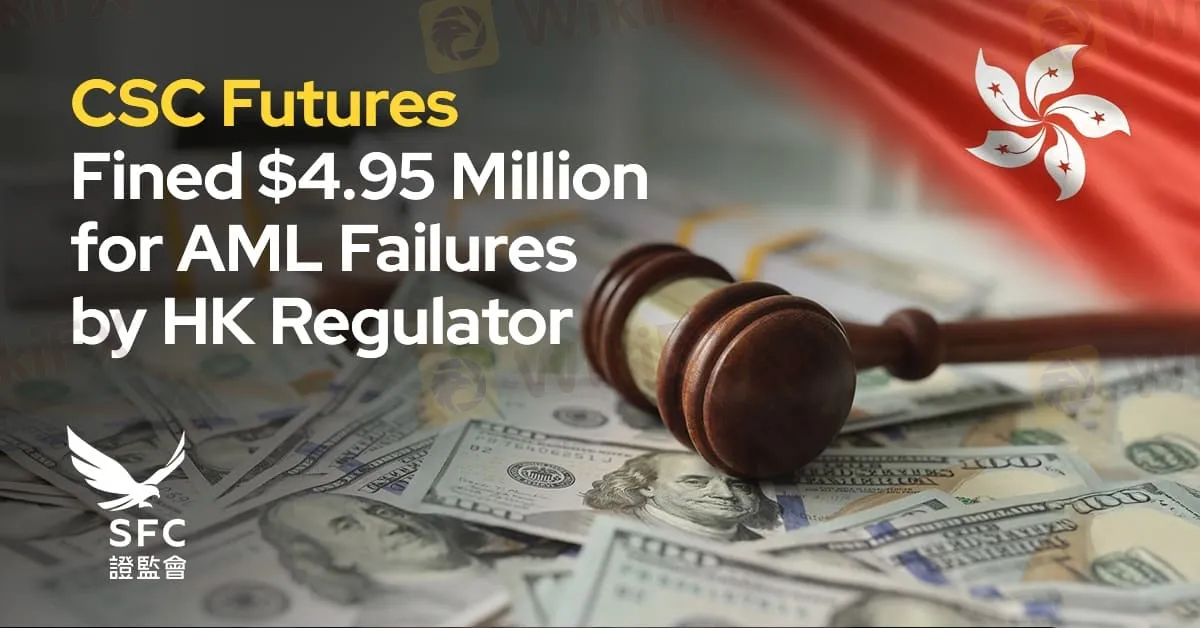简体中文
繁體中文
English
Pусский
日本語
ภาษาไทย
Tiếng Việt
Bahasa Indonesia
Español
हिन्दी
Filippiiniläinen
Français
Deutsch
Português
Türkçe
한국어
العربية
CSC Futures Fined $4.95 Million for AML Failures by HK Regulator
Abstract:The Securities and Futures Commission (SFC) of Hong Kong has taken disciplinary action against CSC Futures (HK) Limited (CSC), imposing a fine of $4.95 million for significant lapses in adhering to anti-money laundering (AML) and counter-financing of terrorism (CFT) regulations.

The Securities and Futures Commission (SFC) of Hong Kong has taken disciplinary action against CSC Futures (HK) Limited (CSC), imposing a fine of $4.95 million for significant lapses in adhering to anti-money laundering (AML) and counter-financing of terrorism (CFT) regulations. These breaches occurred between January 2017 and December 2018, during which CSC was found to have failed in key compliance areas concerning its clients trading activities.
The SFC‘s investigation revealed that CSC did not conduct the necessary due diligence on Customer Supplied Systems (CSSs) used by 100 of its clients for placing orders during the material period. This lack of scrutiny meant that CSC was unable to properly evaluate and mitigate the risks associated with money laundering (ML), terrorist financing (TF), and other financial crimes. The use of CSSs, which allow clients to interface with the company’s trading systems, posed potential risks that went unmonitored, leaving the firm vulnerable to misconduct.

Another critical finding by the SFC concerned irregularities in deposit patterns in five client accounts. The investigation showed that the deposits made into these accounts were inconsistent with the clients declared financial profiles, raising concerns over possible ML/TF risks. Despite these red flags, CSC failed to detect, investigate, or properly address the discrepancies due to inadequate monitoring systems. This failure to implement an effective oversight mechanism meant that suspicious activities could occur without the necessary checks.
The SFC concluded that CSC‘s internal systems and controls during the relevant period were not only inadequate but also ineffective in preventing risks related to AML/CFT. Specifically, the company did not ensure full compliance with Hong Kong’s Anti-Money Laundering and Counter-Terrorist Financing Ordinance, the AML Guidelines, and the SFCs Code of Conduct, all of which set critical standards for financial firms to follow.
In determining the severity of the penalties, the SFC considered several factors. It highlighted that CSC‘s lapses were serious as they could potentially undermine public confidence in the market and damage its integrity. Given the firm’s failure to implement robust AML/CFT measures, the SFC determined that disciplinary action was necessary to reinforce the importance of compliance and risk management within the financial sector.
However, the regulator also acknowledged that CSC cooperated with the investigation and has an otherwise clean disciplinary record. This cooperation likely influenced the SFC's decision on the penalty, but the firms failures in monitoring client activities and implementing sufficient controls were deemed serious enough to warrant the substantial fine.

Disclaimer:
The views in this article only represent the author's personal views, and do not constitute investment advice on this platform. This platform does not guarantee the accuracy, completeness and timeliness of the information in the article, and will not be liable for any loss caused by the use of or reliance on the information in the article.
Read more

ED Exposed US Warned Crypto Scam ”Bit Connect”
The Indian Enforcement Directorate (ED) recently exposed a crypto Scam from a firm called Bitconnect. During the investigation, which took place on February 11th and 15th, 2025. The authority recovered bitcoin worth approximately Rs 1,646 crore & Rs 13.50 Lakh in cash, a Lexus car, and digital devices. This investigation was conducted under the provisions of the Prevention of Money Laundering Act (PMLA) of 2002.

XTB Secures Chilean License, Expands Latin America Footprint
XTB gains a securities agent license in Chile, boosting its Latin America presence. The broker plans to offer stocks, ETFs, and derivatives to local investors.

Why Do You Keep Blowing Accounts or Making Losses?
For many traders, consistent losses can feel like an inevitable part of the journey. Some blame the market, others point fingers at brokers, and many convince themselves that luck simply isn’t on their side. But the reality is that repeated trading losses are rarely down to bad luck alone. Instead, a mix of psychological, emotional, and technical factors often leads traders down the path of blown accounts and frustrating setbacks. Understanding these deeper issues is key to breaking the cycle and becoming a more resilient and strategic trader.

eToro Adds ADX Stocks to Platform for Global Investors
eToro now offers stocks from the Abu Dhabi Securities Exchange, giving global investors access to leading UAE companies in sectors like energy, finance, and healthcare.
WikiFX Broker
Latest News
Pi Network Mainnet Launch: Game-Changer or Crypto Controversy?
GlobTFX Users Report Same Issue! But Why?
Rate Cut or Not? It Depends on Trump’s Policies
eToro Adds ADX Stocks to Platform for Global Investors
Why Do You Keep Blowing Accounts or Making Losses?
B2BROKER Launches PrimeXM XCore Support for Brokers
Germany's Election: Immigration, Economy & Political Tensions Take Centre Stage
WikiFX Review: Is IVY Markets Reliable?
WikiFX Community Creator Growth Camp
Effect of Tariffs on Gold and Oil Prices
Currency Calculator






